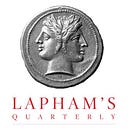The World’s Greatest Outlaw
The life of Samuel Johnson, would-be attorney-at-law
By Richard Cohen
Toward the end of his life, Samuel Johnson drew up a list of subjects that he would like to research. He projected forty-nine works in all; none was on any aspect of the law. According to James Boswell, Johnson’s celebrated biographer, almost the only subjects sure to distress Johnson when raised were mortality, particularly his own, and what might have transpired had he become a lawyer. Even when nearing seventy, he rounded on his friend William Scott, who had innocently commented, “What a pity it is, sir, that you did not follow the profession of the law. You might have been lord chancellor of Great Britain and attained to the dignity of the peerage.” According to Boswell, “Johnson, upon this, seemed much agitated; and in an angry tone exclaimed, ‘Why will you vex me by suggesting this, when it is too late?’ ” For here lay a curious paradox: of all great writers, in any language, Johnson was the one most consumed by the law, yet he never practiced it, and being relegated to the position of an outside observer brought him profound misery — even as he acknowledged his career could not have been otherwise.
For the young Johnson, actually studying the law in any formal way had proved impossible. After leaving Oxford without a degree (he was…
